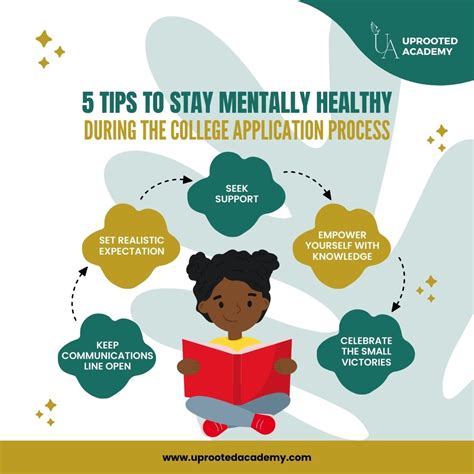How to Stay Mentally Healthy While Pursuing Your Education

Pursuing education is a deeply rewarding journey, but it can also be challenging—both academically and mentally. Between the pressure to perform well, manage personal responsibilities, and juggle social commitments, maintaining mental well-being can sometimes take a backseat. However, prioritizing mental health is essential not only for academic success but for overall life satisfaction. Here are practical strategies to help you stay mentally healthy while navigating your educational path.
Set Realistic Expectations
A common source of stress for students is the pressure to achieve perfection. Whether it's getting the highest grades, balancing a social life, or meeting external expectations, the pursuit of perfection can lead to burnout and feelings of inadequacy. Setting realistic, achievable goals is key to maintaining mental health.
Instead of aiming for flawless results, focus on steady progress. Break large tasks into manageable steps, and remember that it's okay to make mistakes. Learning from them is part of the educational process, and often, it's the imperfections that lead to the most growth.
Manage Time Effectively
Poor time management is a major stressor for students, often leading to feelings of overwhelm and anxiety. To manage your academic responsibilities without sacrificing your mental health, create a structured schedule.
Use planners, digital calendars, or task management apps to organize your assignments, deadlines, and personal activities. Prioritize your tasks based on urgency and importance, and break them down into smaller, manageable steps. Set aside time for breaks and relaxation, too—balance is crucial to maintaining mental clarity and focus.
Prioritize Sleep
Sleep is one of the most critical components of mental health, yet it's often the first thing students sacrifice when under pressure. Chronic sleep deprivation can contribute to anxiety, depression, and difficulty concentrating. In fact, studies have shown that poor sleep habits can negatively impact academic performance.
Make sleep a priority by aiming for 7-9 hours of quality sleep each night. Develop a sleep routine, such as winding down an hour before bed, avoiding caffeine late in the day, and limiting screen time. A well-rested mind will be more focused, productive, and resilient in the face of challenges.
Stay Physically Active
Physical activity is not just good for your body—it’s essential for your mind. Regular exercise has been shown to reduce symptoms of depression and anxiety, improve mood, and boost cognitive function. Whether it's going for a walk, doing yoga, or participating in team sports, staying active helps release endorphins, the body's natural stress relievers.
Incorporate movement into your daily routine, even if it's just a short walk between study sessions. A brief burst of exercise can help clear your mind and improve your ability to focus, making you more productive in the long run.
Maintain a Balanced Diet
What you eat has a direct impact on your mental health. A balanced diet rich in nutrients can help stabilize mood and energy levels. Avoid relying on processed foods, excessive caffeine, or sugary snacks, which can lead to energy crashes and affect concentration.
Instead, focus on incorporating whole foods—such as fruits, vegetables, whole grains, lean proteins, and healthy fats—into your meals. Omega-3 fatty acids, found in fish like salmon, are particularly beneficial for brain health. Drinking enough water and staying hydrated is also crucial for optimal brain function.
Practice Mindfulness and Stress Management
Academic life can often feel like a constant rush, leaving little time for reflection. Practicing mindfulness can help you stay present and manage stress effectively. Mindfulness involves paying attention to the present moment without judgment, which can help reduce feelings of anxiety about the future or regret about the past.
Incorporate mindfulness practices into your daily routine, such as meditation, deep breathing exercises, or simply taking a few minutes to pause and relax during stressful moments. Even short breaks for mindfulness can help improve focus and reduce anxiety.
Build a Support System
No one should navigate their education alone. Having a support system—whether it’s friends, family, mentors, or peers—can provide emotional stability and encouragement when things get tough. Don’t hesitate to reach out when you’re feeling overwhelmed. Sharing your feelings and discussing your challenges can lighten the mental load.
Joining study groups or participating in student organizations can also help you build connections with others who understand what you're going through. Having a community of like-minded individuals can foster a sense of belonging and provide a safe space for venting, support, and shared experiences.
Seek Professional Help When Needed
Mental health challenges such as anxiety, depression, or chronic stress are not uncommon among students. If you’re struggling with your mental well-being, it's important to seek professional help. Most schools offer counseling services, and there are numerous online resources available as well.
Speaking with a therapist or counselor can provide valuable coping strategies, as well as a safe, confidential space to discuss your feelings. Never hesitate to reach out for help—it’s a sign of strength, not weakness.
Take Time for Yourself
Amid the demands of coursework, exams, and extracurricular activities, it's easy to forget the importance of downtime. Taking regular breaks and engaging in activities that bring you joy can significantly reduce stress and improve mental clarity.
Whether it’s reading for pleasure, listening to music, practicing a hobby, or spending time in nature, make sure you carve out time for self-care. Doing things that make you feel relaxed and happy will recharge your mental energy and help you approach your studies with renewed focus.
Remember the Bigger Picture
Sometimes, the intensity of academic life can cause you to lose sight of why you started your educational journey in the first place. It’s easy to get caught up in grades, exams, and deadlines, but don’t forget that education is about growth, exploration, and personal development.
Keep reminding yourself of your long-term goals and the passion that led you to pursue your education. Embrace the process of learning rather than focusing solely on the end result. This mindset can help alleviate pressure and cultivate a more balanced, fulfilling academic experience.